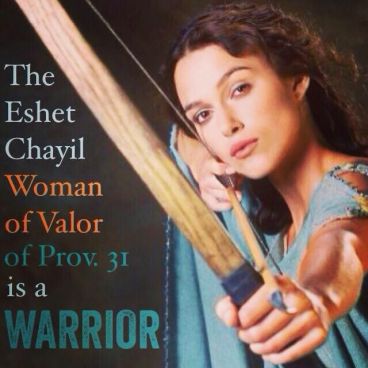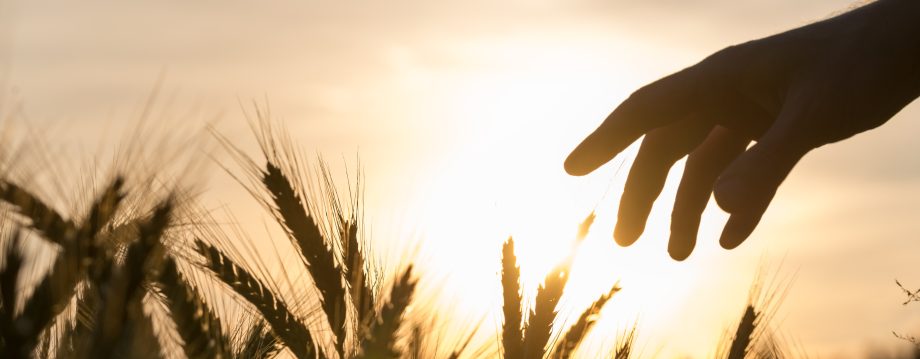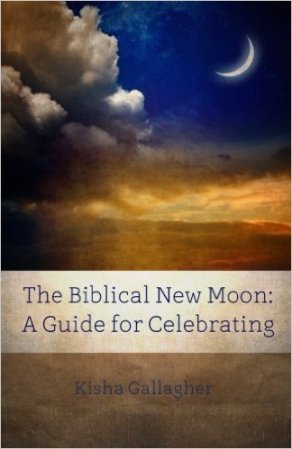Woman of Valor
Please refer to Part I, II, and III of this series for the best context.
On Mother’s Day one the most quoted passages during Sunday morning services is Proverbs 31. Each mother is commended for her role as a virtuous woman. Images of Mother Theresa and other conservative humanitarian women come to mind. Most women and especially men, envision the Proverbs 31 woman to be plain, prudish, and quite frankly — boring. Yet, both genders believe that this (boring) image of women is what God truly desires. So, we all sit in the pews extolling something that women believe they can never measure up to, and men only wish they found attractive. But no one dares to verbalize these inward thoughts. Instead, we all smile and nod and pray to God that He change our dreadful hearts.
I have some great news if you identify with my sentiments. Though the Proverbs 31 woman is often translated as the “Virtuous Woman,” that is not what the text says in Hebrew. In fact, as we investigate the original language about this “ideal” woman, you will find that she is anything but boring! Women will sigh in relief and gasp with delight in the fact that YHWH truly knows their heart. Men will rediscover that the woman YHWH made just for him is not only attractive, but exciting!
The Eshet Chayil
Who can find a virtuous woman? for her price is far above rubies. (Pr. 31:10 KJV)
 The Hebrew terms for virtuous woman are “eshet chayil.” While eshet does mean woman, chayil is often translated as virtuous, excellent, good, vigorous, worthy, capable, or valorous (valor) in this verse. Strong’s Bible definitions defines it this way: a force, whether of men, means or other resources; an army, power, might, host, wealth, virtue, valor, strength, and worth.
The Hebrew terms for virtuous woman are “eshet chayil.” While eshet does mean woman, chayil is often translated as virtuous, excellent, good, vigorous, worthy, capable, or valorous (valor) in this verse. Strong’s Bible definitions defines it this way: a force, whether of men, means or other resources; an army, power, might, host, wealth, virtue, valor, strength, and worth.
In nearly every one of its uses, chayil is coupled with men, particularly strong men of war. There is no room in this Hebrew term for plainness, meekness, or weakness. So why, when chayil is joined with women, do the translator’s choose to “soften the blow” with English words that hide the “strong force” of the Hebrew? What happened to all the power and might of chayil?
I submit to you that part of the reason is based in the fallen nature of Adam. Subtle (and not so subtle) misogyny has plagued the Body for far too long. The truth is that the word chayil empowers women beyond the status quo of many men’s comfort zones. I will admit however, that most of these men mean well and really believe they are in God’s will by mastering or ruling over women. They (and women) have been told and trained that this is their God given right for a very long time. My hope is to peel back the English language and centuries of church tradition to reveal the freeing reality of what YHWH and the Hebrew text really says about women.
Warrior
A chayil, in its simplest translation, is a warrior. The introduction of the Proverbs 31 woman is more accurate to the Hebrew text when it uses words like this: “Who can find a powerful, mighty, valiant woman?” This is the true “ideal” woman; but just in case you think I’m reaching, the succeeding verses (in Hebrew) reveal the same message.
Here are some examples of this courageous woman that are obscured by the English translation. In verse eleven, her husband “has no lack of gain,” the word for gain is “shalal,” which usually means booty, spoil or plunder. This is the type of gain that a warrior brings back from a successful military battle. The valorous woman knows how to prosper her family spiritually and physically. Thus, she blesses her husband and children.
In verse fifteen, “she rises while it is still night and provides food for her household,” the word translated food is “teref,” the normal word for prey. Like a lioness hunting in the night, bringing back prey for her cubs, a woman provides for her family. The suggestion of fierceness or violence adds to the woman’s portrayal as a chayil. Verse seventeen declares that “she girds herself with strength, and makes her arms strong.” The Hebrew word for strong (arms) is “amatz,” meaning courage. Can you see the warrior imagery in each instance?
 Verse twenty-five is of special import to our study. The woman says, “strength and dignity are her clothing, and she laughs at the time to come.” The last phrase is yom acharon. This literally says, “She laughs in the latter days.” This is another prophetic text about the role restorations we have been exploring. This warrior woman is prepared both physically and spiritually for the last days. For as we’ve seen in the previous articles, she is most likely laughing for joy at her complete restoration in her role as ezer.
Verse twenty-five is of special import to our study. The woman says, “strength and dignity are her clothing, and she laughs at the time to come.” The last phrase is yom acharon. This literally says, “She laughs in the latter days.” This is another prophetic text about the role restorations we have been exploring. This warrior woman is prepared both physically and spiritually for the last days. For as we’ve seen in the previous articles, she is most likely laughing for joy at her complete restoration in her role as ezer.
The fact that the Proverbs 31 woman is brave, mighty, valorous, and powerful cannot be denied. Think of this the next time you read this passage or are subjected to another teaching about the meek, weak, and quiet woman. God designed woman to be an ezer. Do you recall what an ezer actually is? An ezer is a help, rescuer, savior, and protector. This sounds an awful lot like an eshet chayil, does it not? What does a warrior do but fight for and protect what is theirs? This is real biblical womanhood.
Real Roles
But lest you think that all these terms are some how condoning the emasculation of men or usurping their vital role, I must explain this further. Men and women were created equal, but different. Each gender has specific roles to play in God’s design. What I have been putting forth to you is a return to God’s original plan. What must be removed are tradition, dogma, and most importantly our fallen nature if we desire to live and walk out this restoration. Our Messiah, Yeshua (Jesus), has already paved the way for us to overcome our nephesh (flesh). He has freed us from this slavery. But too often, we are still wearing shackles in the form of tradition[1] and doctrine.[2] We must choose to break free from these manmade chains.
The man is created to work and serve the creation. His domain of work or service is primarily outside of the home. He is like the man in Proverbs 31 that sits at the city gates. He is there to guard the city, give counsel, and do business. But the woman is built with the same fierceness and power as the man. Her domain or service is primarily inside the home. Her service benefits her man and her children. But what she does and how she does it is identical to the man. The difference is in the object of their service. No one gender rules or exercises dominion over the other. They are equal and equally capable both inside and outside of the home.
Deep down every woman knows she was designed to bless her husband. While he may accuse her of being a control freak or a micro manager, the truth is that she can’t help her herself. She is an ezer; and as such, she is his counselor, protector, and guide. The problem for what seems like forever is that neither the woman nor the man have known WHY she’s the way she is. I hope that by now you can answer that age old question.
In Part V, we will look at the Proverbs 31 woman on a deeper spiritual level.
[1] Mar 7:13 thus invalidating the word of God by your tradition which you have handed down; and you do many things such as that.”
[2] Mar 7:6-8 And He said to them, “Rightly did Isaiah prophesy of you hypocrites, as it is written: ‘THIS PEOPLE HONORS ME WITH THEIR LIPS, BUT THEIR HEART IS FAR AWAY FROM ME. (7) ‘BUT IN VAIN DO THEY WORSHIP ME, TEACHING AS DOCTRINES THE PRECEPTS OF MEN.’ (8) “Neglecting the commandment of God, you hold to the tradition of men.”





Pingback: Deborah the Bee | GRACE in TORAH
Would you care if I shared this teaching, giving you credit of course, on my site called Obadiah’s Cave?
Amazing teaching here!
Blessings!
LikeLiked by 1 person
Hi Tekoa,
I was just reading some of your blog posts (the last author of the month post made me cry). My fourteen year old son just started reading The Outsiders. I plan on checking out your books as well. I love fiction as well as nonfiction — and you write both! Yes, please feel free to share my series on women. Thanks for stopping by — I’m sure will speak again soon.
I plan on checking out your books as well. I love fiction as well as nonfiction — and you write both! Yes, please feel free to share my series on women. Thanks for stopping by — I’m sure will speak again soon.
Shalom, K
LikeLike
That website is set up for fiction and book events. My website for teachings is at newwineskins.net and its called Obadiah’s Cave a safe place… That is where I will be placing your teaching and I know its going to bless many! Awesome.
LikeLiked by 1 person
Great! Thanks for the clarification; I’ll be visiting soon! 😊
LikeLike
So, reading this section reminded me of a verse in 1 Peter 3…
“Husbands, likewise, dwell with them with understanding, giving honor to the wife, as to the weaker vessel, and as being heirs together of the grace of life, that your prayers may not be hindered.” (verse 4)
What you’re talking about in this section and what this scripture says seems to be a contradiction. As this section describes us women as warriors, not weak at all.
In my walk with the Father over the years, I have learned that when there is a perceived contradiction in scripture, it is actually an opportunity for reconciliation, clarification and understanding the scriptures in context.
So, what is going on here that I can’t see? Thanks 🙂
LikeLiked by 1 person
The “vessel” or body of a woman is indeed weaker than a man’s body. (At least in most cases.) This reality has caused many to conclude that the whole woman (spiritually and physically) is therefore less than or weaker than a man. But, YHWH’s word doesn’t say this. In fact, the Proverbs 31 woman is a prime example of the strength that He gave to females. Women might be physically weaker than men, but their minds, hearts, and spirits are certainly not.
Peter reminds men to be understanding with their wives. What might men “misunderstand” about women? Women are typically more sensitive than men. Is this a weakness? Women are often moved to tears more easily than men. Is this a weakness? Is there something men need to try to “understand” and honor in their wives?
Peter says that women are coheirs with men in the grace of life. They are equal counterparts, even though they are different. Peter urges men to NOT forget this — to not count women’s different dispositions as nonsense or as “less” than whole.
For if men regulate their wives as something “less”, their prayers will be hindered! This is how much YHWH loves His daughters. Wow. Just wow.
LikeLike
Pingback: What Do Costumes Have to Do With the Book of Esther? | GRACE in TORAH
Pingback: Vrouwe Israel Spreuken 31 | Tegenhetlicht
Thank you so much for writing this series and sharing! This understanding of God’s Word, His plan, his design of women and our role with our spouse and family is beautiful and powerful! It is so destructive when we women and others lack true understanding. It is freeing and invigoratibg to realize I was formed with these qualities, I don’t have to be delivered from them! ❤
LikeLiked by 1 person
Amen! Thanks, Melody!
LikeLike
Pingback: Sheep Among Wolves | GRACE in TORAH
Pingback: Haftarah: Vayera | GRACE in TORAH
This is so helpful!! Thank you for writing it!
LikeLike